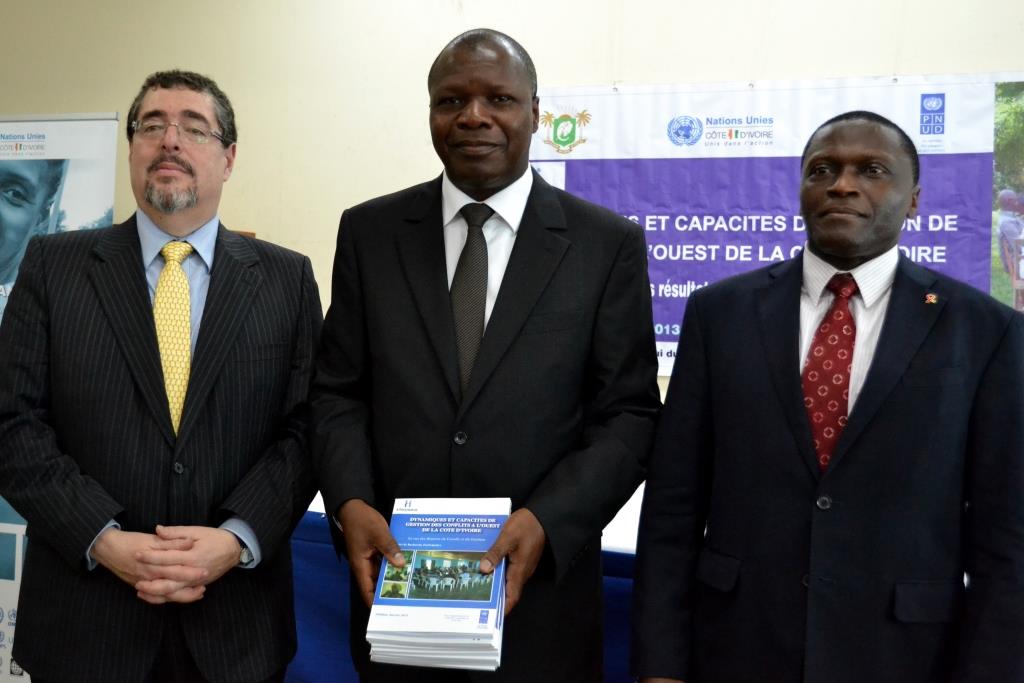Côte d’Ivoire: Shedding light on the causes of conflict

Recognizing the need to uncover the roots of recurring conflict in Côte d’Ivoire, Interpeace was mandated by the Joint Steering Committee of the Priority Plan for the Consolidation of Peace1 to conduct initial research in the western parts of the country – which are among the areas experiencing repeated cycles of violence.
The research was conducted with the support the United Nations Development Programme and the United Nations Peacebuilding Fund and involved more than 300 participants in the Cavally and Guémon regions of western Côte d’Ivoire. The results of this research have been collected in a report that was presented in Abidjan today, in the presence of the Minister of Plan and Development.
The tip of the iceberg
The political crisis that followed the 2010 presidential elections caused the levels of violence to escalate and brought the country to the brink of civil war. A year and a half after the crisis, the situation remains fragile. State institutions and security forces are being attacked regularly, the political opposition feels excluded from the decision-making process and violence keeps erupting in the western parts of the country. In short, the root causes of conflict remain unresolved.
Four main issues emerged from the participatory and inclusive dialogue process: land tenure, the political instrumentalization of ethnicity, weak state institutions and the 2002 crisis as well as the 2011 post-electoral crisis. But the research reveals that these issues, which had already been identified by previous conflict mapping studies, merely present the tip of the iceberg. The consultations brought to light that there is a widespread feeling of having been victimized during the conflict.
A widespread feeling of being victimized
As one of the participants in the dialogue sessions put it: “The reason why reconciliation is blocked is simple. Everyone thinks they have suffered more from the war than the others. Who will reach out to their friend to ask for forgiveness?” It has therefore been highlighted by local inhabitants themselves that this victimary rhetoric should be addressed alongside any initiative aiming to sustainably solve the recognized issues of land tenure, ethnicity and its political instrumentalization, the state’s weakness, or the impact of the 2002 and 2011 crises.
“A majority of Ivoirians consulted tend to see themselves only as victims of the conflict and disregard the perception of their fellow citizens,” explains Dr. Séverin Kouamé, the local researcher who has been in charge of the production of the report. “Recognizing and taking into account this behaviour based on a common feeling of victimization is a first step towards overcoming this cross-cutting issue. During the discussions, it appeared that in all matters that were identified as sources of violence, everyone perceives themself as a victim. This problem is so widespread that it becomes a central factor of tension and is not only a cause for violence but also hinders other development projects.”
The way forward
The way forward should therefore involve taking into account the demands and priorities expressed consensually by the stakeholders, and rapidly engaging all levels of society in a process of change that is as inclusive as possible. This process should aim not only to promote a culture of constructive and participatory dialogue to rebuild trust and overcome divisions within communities, but also to instigate a participatory research on sustainable concrete technical solutions to the issues identified.
This research is a critical first step in extending the dialogue process to other regions of the country, which will be necessary to overcome the sentiment of victimization and uncover and prioritize the main obstacles to lasting peace. This will then enable the development of a strategy to effectively address these issues in a way that is acceptable to the local population.
A participatory process
“Representatives from all sectors and levels of society contributed to identifying the root causes of violence and consolidated their findings in a regional dialogue group meeting at the end of last year,” notes Bernardo Arévalo de León, Deputy Director-General, Research and Development at Interpeace. “The team used a methodology that puts local people in the driver’s seat. Allowing societies affected by conflict to develop their own solutions to the challenges they face instils a sense of ownership.”
Participatory Action Research, an approach developed by Interpeace, allows participants to get together in a safe and peaceful space that enables neutral and open discussions among local people. The report is now going to form the basis for a much needed dialogue process in other parts of western Côte d’Ivoire. A broader dialogue is needed to further ascertain and address the obstacles to peace.
Over 80 representatives from the international community, local and international NGOs, United Nations agencies and the government came together at the Centre de Recherche et d’Action Pour la Paix for the highly anticipated launch of the report. The findings of the report have informed a number of policy recommendations that have been submitted to the national government and international stakeholders to offer solutions that could break the cycle of violence.
The full report (in French) can be downloaded here (PDF).
1. Co-chaired by the Minister of State, Planning and Development and the Resident Coordinator of the United Nations System.
